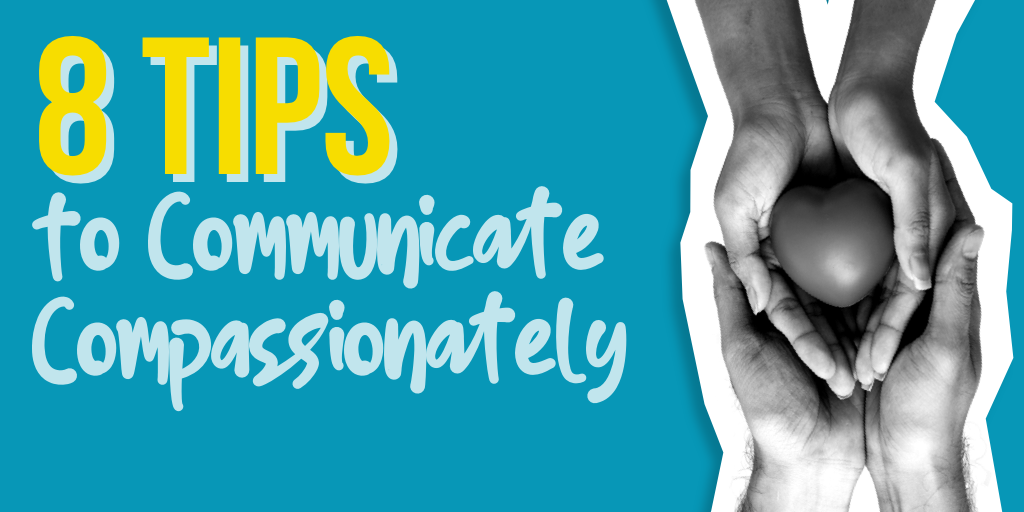There is this one conversation I keep having about communication. It’s about “brutal” honesty and how shitty it is, and it came up again in my LIVE last Thursday.
I can’t stress enough that brutal honesty is just an excuse to bully people with truth, and that we all should be aiming for compassionate honesty.
But what is compassionate honesty?
And what does compassionate communication look like, overall? That’s what I’m talking about today.
Eight weeks ago, I wrote that communication is a tool, not a solution. I mentioned that without a few key elements, communication is more likely to harm than to heal. Those are:
- Priorities
- Openness
- Respect
- Compassion
- Autonomy
So far, I’ve covered priorities, openness and respect. Today, I’m tackling compassion.
Empathy versus compassion
A lot of focus is put on empathy, which can be a good thing in many ways, but the challenge with empathy is that we don’t always empathize.
And it’s not because we are necessarily bad people. You could be like me and be born with little to no natural empathic ability.
Or, the experience that someone else is going through might be so far out of your understanding that you just can’t really empathize.
AND there are the times when you might empathize TOO strongly, and feel their feels, instead of being there for them, you’re too deep in with them.
Compassion is a skill you can learn to use even when your empathy fails you.
What does compassionate communication look like?
It’s a sincere desire to find the best solution for everyone. It is a desire to understand the other’s perspective, and acting with a goal towards minimizing harm.
It is not always getting it perfect.
We are humans, and we will never be perfect.
But as I’ve said before, effort means a lot. (https://datingkinky.com/blog/effort-means-a-lot, https://fetlife.com/users/50648/posts/4776784)
And the authentic effort put into understanding and not harming matters.
- “I don’t know how to say this…”
- “Could you please say that in another way? I’m not really understanding what you mean.”
- “Could you tell me how that makes you feel?”
- “Oh! That’s something someone else has said. Thank you for bringing it up.”
- “I know you’re sensitive about [THING], and I want to be as kind as possible when I say…”
And so on.
And let me be clear: it’s not the WORDS, it’s the intention. You can say those words in manipulative ways, too, and I’m hoping you know the difference (in yourself at least).
So, here are 8 ways to communicate compassionately:
1. Focus on what they are saying.
Humans are self-centered creatures. It’s in our nature, and that’s actually a good thing. In fact, many of us could stand to be MORE self-centered.
But I digress.
In a conflict or potentially intense conversation, we humans have a tendency to hear words, but not listen. To be engaged only as long as it takes to find something we want to reply to, then shut everything off waiting for our turn.
That’s no bueno.
So, take a deep breath and LISTEN. Don’t worry about getting to speak your mind—it will happen.
(Or it won’t, and you know they are not a compassionate communicator, and you have a choice to make.)
Really listen and think about what they are saying and what it means to them.
2. PAUSE before responding.
Take a moment. More than a moment. Digest what they have said. Take five deep breaths. Don’t rush it. Don’t hurry.
Give them the honor of being in your thoughts for a short while before your speak.
3. Take care with your words.
In that pause, think about how your words may impact the other person. Change a few things here or there, to do the least amount of harm when you open your mouth.
You may still unintentionally harm. That’s part of being humans humaning with other humans.
If you do, apologize, and make a note so you can hopefully avoid that same mistake in the future.
4. Thank them, or show your appreciation.
Before launching into your own dialog, thank them for sharing, or show appreciation for what they said. Show that you actually value their communication to you.
5. Don’t assume the worst. (https://fetlife.com/users/50648/posts/5062672)
Give your partner the benefit of the doubt. If something they said stung or felt mean, realize that perhaps they meant it differently than you would mean it if you said that thing.
Don’t put words and thoughts into their head.
It’s a common mistake. And it leads to huge misunderstandings and continuing arguments, all based on one wrong assumption.
Better to clarify: “Hey, when you said this, I felt that. Could you please tell me more about what you meant?”
6. Don’t take it personally if they are not compassionately communicating.
Difficult topics and conversations carry their own trauma with them.
Understanding that the other person may be reacting to things from their past in addition to having their own needs and preferences (that they may or may not have been able to articulate yet) can go a long way.
It’s not always YOU, and even if it is, if you take it personally and lash out, it’s only gonna get worse.
7. Be authentic.
Don’t lie. Don’t hide how you are feeling. You gotta be you for this to work. Just make full use of step 3 and take care with your words.
Sometimes we have to say hurtful things, and doing it in the most compassionate way possible is good for everyone.
8. Practice.
Don’t wait until a deep conversation. Practice compassionate communication in everyday life.
Instead of: “I told you to take out the trash yesterday!”
Try: “I know yesterday was crazy, and you were stressed. Could you take the trash down on your way out the door?”
Instead of: “How many times do I have to tell you I hate radishes?”
Try: “Just a reminder: I don’t like radishes, so you can have them all when you make us a salad.”
Instead of: “You never remember my birthday!” (On the evening of.)
Try: “I’m so excited to do something special with you next Friday for my birthday!” (The week before.)
And so on.
Compassionate communication requires thought.
It’s definitely more labor-intensive than just saying whatever. It requires practice.
And it’s worth it.
There is a lot less conflict and escalation. Less drama. More love.
What are your thoughts?
Do you focus on compassion in your communications with the people closest to you?
Do you feel like the people closest to you use compassionate communication towards you?
It’s a lot of internal work. Is it worth it to you?









